Key takeaways:
- The UK housing crisis is driven by a mix of economic, social, and political factors, leading to emotional distress for many individuals and families.
- Current housing prices are at record highs, with affordable options becoming increasingly scarce, causing frustration among potential homebuyers.
- The media’s portrayal of housing issues often overlooks personal stories, emphasizing the need for critical examination of policies and initiatives aimed at solving the crisis.
- Proposed solutions include implementing rent controls, increasing affordable housing through community land trusts, and enhancing support for first-time buyers to promote equitable housing access.
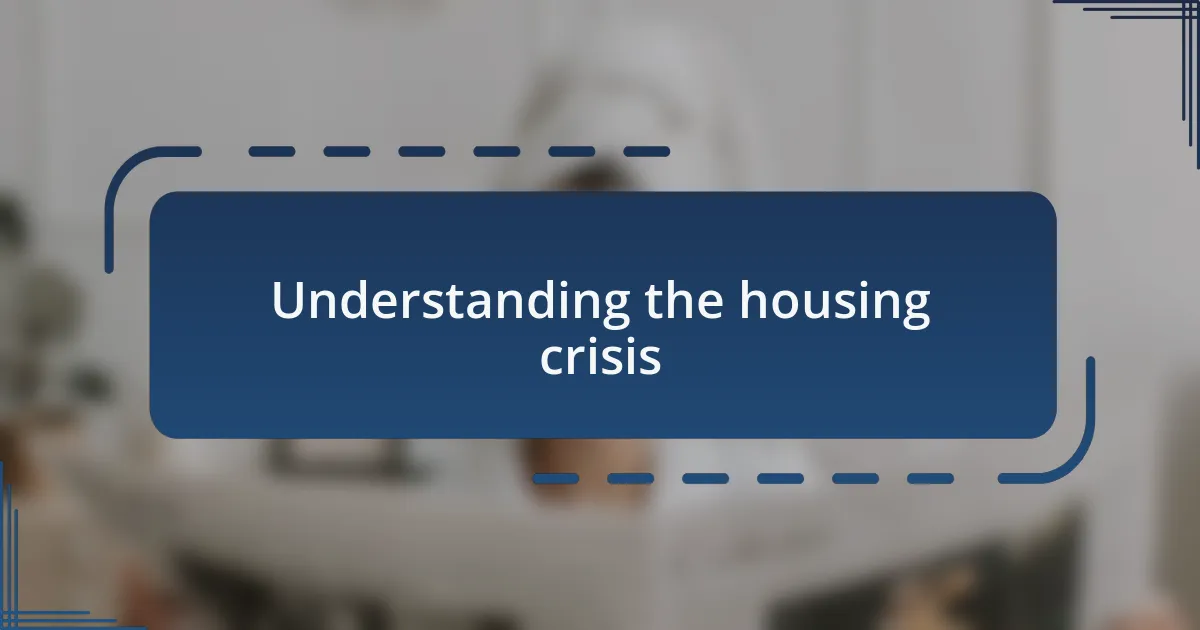
Understanding the housing crisis
Understanding the housing crisis involves looking beyond just numbers and statistics; it’s about real people facing real struggles. I remember a friend who had to live in her car for months because rental prices skyrocketed in her area. How can we call a place home when it becomes increasingly unattainable for so many?
The crisis isn’t solely about affordability; it’s rooted in a complex web of economic, social, and political factors. I often think about young families who, despite working hard, find themselves priced out of neighborhoods where they’ve grown up. Are we not risking a future where only the fortunate few can plant their roots in their communities?
Moreover, the emotional toll is profound. I met a couple who had to let go of their dream of owning a home, opting for temporary rental solutions instead. Imagine the weight of that decision hanging over them. How does one navigate a future filled with uncertainty when the very basics of stability seem to be slipping away?
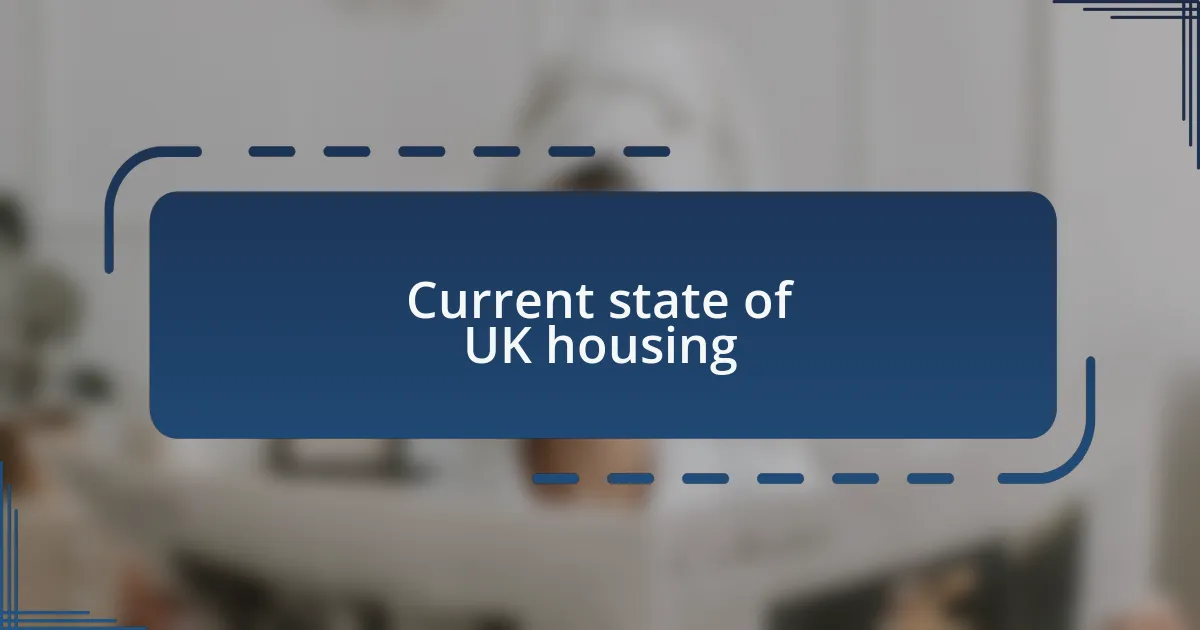
Current state of UK housing
The current state of UK housing reflects a tumultuous landscape, with average property prices reaching record highs. I recall a visit to a friend’s flat in London, where I was struck by how small yet costly it was—nearly impossibly priced for anyone without a substantial income. How did we get to a point where the very concept of “home” feels synonymous with financial strain and mental exhaustion?
In many areas, affordable housing is not just a distant dream; it’s practically non-existent. I speak with friends who are looking to buy, only to find that what they can afford hardly compares to what they imagined. Can we truly say we’re building a society that supports all its citizens when whole generations are in limbo, unable to find suitable places to call their own?
Interest rates have recently spiked as well, placing additional burdens on aspiring homebuyers and renters alike. I spoke to a colleague who had just received a mortgage offer that turned out to be much higher than they anticipated. It’s disheartening to think that dreams of homeownership are slowly morphing into unattainable goals for so many. What happens when a home becomes yet another item on a list of unfulfilled desires?
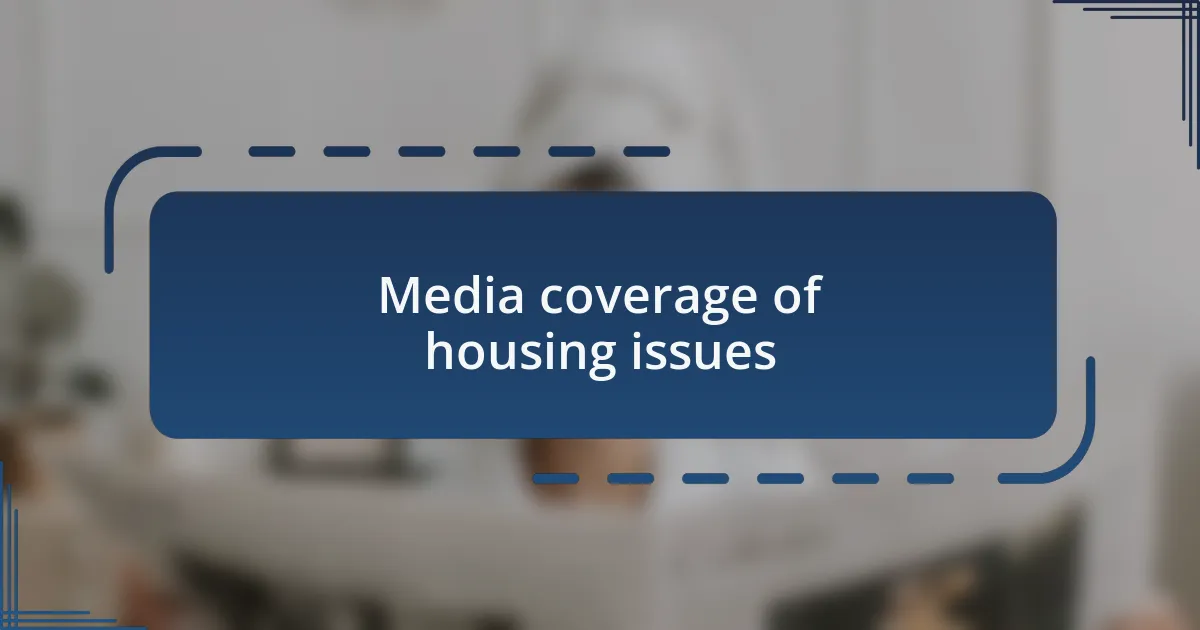
Media coverage of housing issues
The media plays a crucial role in shaping public perception of the housing crisis, often highlighting the disparity between soaring prices and stagnant wages. I remember watching a documentary that showcased families living in cramped conditions, struggling to make ends meet. How can we ignore the emotional toll when the headlines focus solely on statistics rather than real human stories?
Many outlets frequently report on government initiatives aimed at increasing housebuilding, yet I often find myself wondering—are these measures enough? I recall reading an article that hailed a new housing project as a solution, only to discover later that it barely scratched the surface of the crisis. It’s frustrating when the media presents these developments without critically examining their effectiveness in truly addressing the needs of our communities.
Moreover, local newspapers sometimes provide a more personal touch, covering individual stories that national media might overlook. I once read about a single mother who shared her struggles to find affordable housing in my area. This type of coverage resonates on a deeper level, prompting us to reflect on the broader implications of the housing crisis and encouraging community conversations about real solutions.
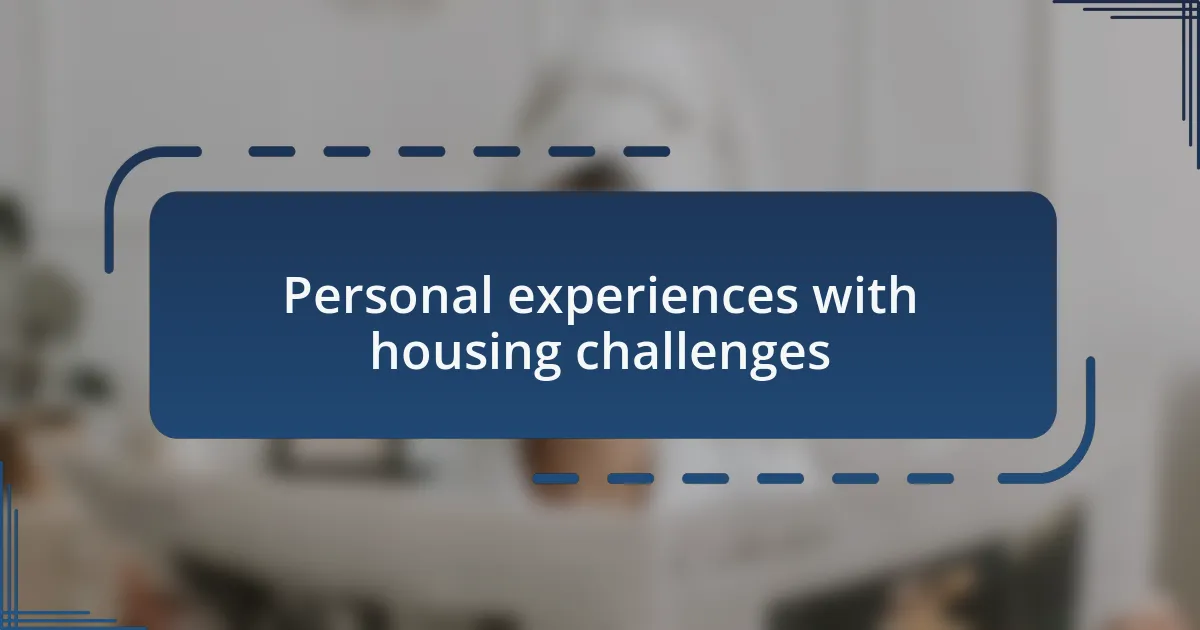
Personal experiences with housing challenges
I recall the time when I decided to search for my first flat. The excitement quickly turned into stress as I faced the harsh reality of skyrocketing rent prices. It felt disheartening to realize that what I could afford barely resembled the listings I had dreamt of; how was I supposed to start my adult life in a space that felt like a box?
Later, I found myself in a flatshare that was nothing short of chaotic. My housemates had different lifestyles and expectations, making simple tasks like sharing the kitchen challenging. It made me think: why is securing a comfortable living situation often so disruptive and fraught with tension? It’s not just about finding a place; it’s about finding a home where we can genuinely thrive.
Most recently, I’ve encountered the stark contrast in our community when it comes to the housing options available. Walking through my neighborhood, I see luxury developments sprouting up, surrounded by families still struggling to find suitable accommodations. The inequity is palpable. Are we really prioritizing the right type of housing for our community’s needs, or are we just chasing profit over people? Every time I reflect on this, I feel a mix of frustration and sadness, as it emphasizes the urgent need for more thoughtful housing solutions.
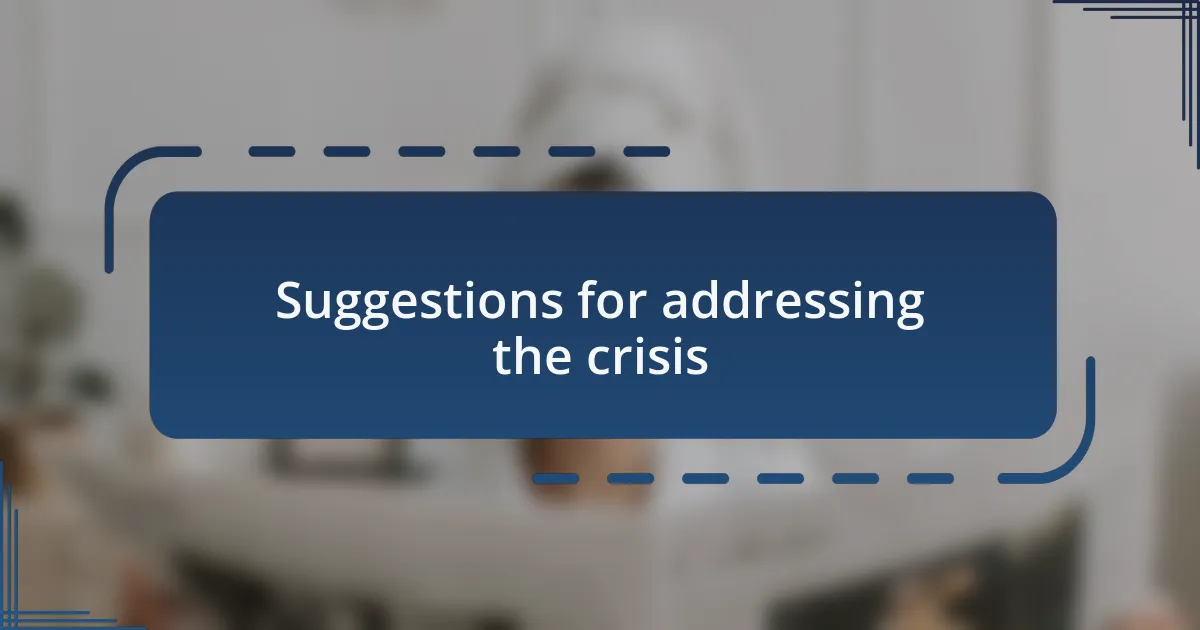
Suggestions for addressing the crisis
One practical solution I believe could make a difference is the implementation of rent controls in areas experiencing drastic price increases. During a recent discussion with a friend who had to relocate to a different city just to find affordable housing, we both felt the emotional toll of such a transition. Wouldn’t it be beneficial if more local governments considered policies that protect tenants from excessive rent hikes?
Additionally, increasing the availability of affordable housing through community land trusts can empower local residents. I remember visiting a neighborhood where a community land trust helped families stay in their homes despite rising property values, fostering a sense of belonging. Isn’t it time we shifted focus towards models that prioritize community well-being over profit?
Finally, enhanced support for first-time buyers could help bridge the gap for many aspiring homeowners. I often think about how many of my peers feel that homeownership is an unattainable dream. What if we had more financial education programs and accessible resources to guide young people through the buying process? These changes could potentially transform countless lives by making homeownership a reality rather than a distant aspiration.
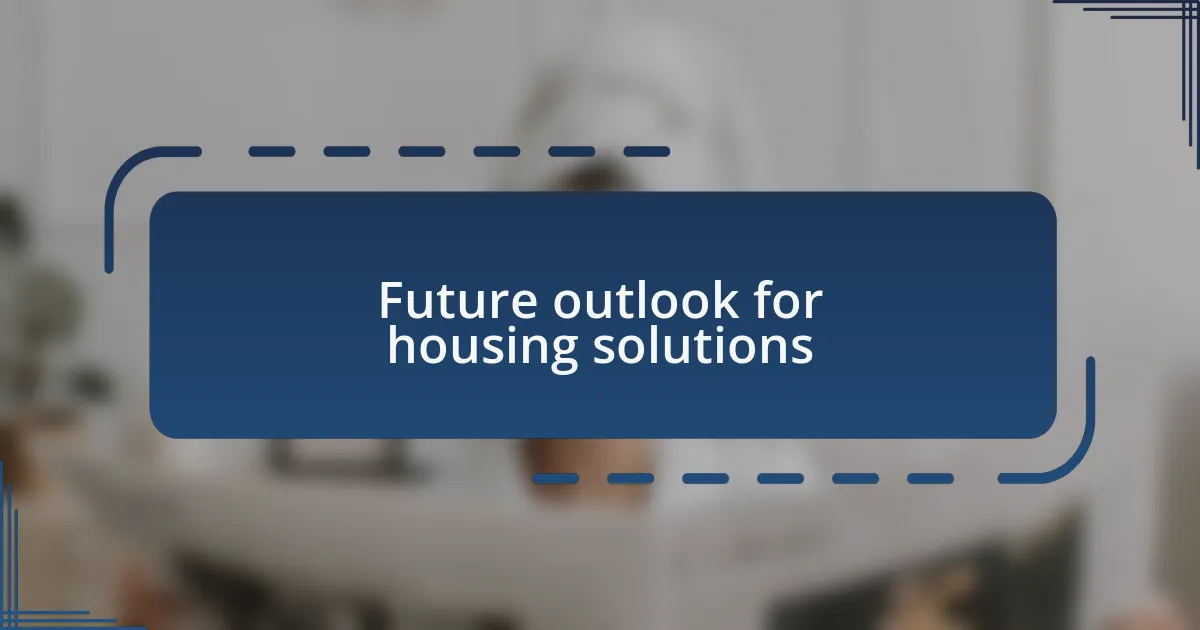
Future outlook for housing solutions
The future of housing solutions hinges on innovative approaches to sustainability and eco-friendly building practices. I recently visited a development that utilized recycled materials and energy-efficient designs, demonstrating how we can create affordable homes without compromising the environment. Could adopting these practices across the board result in not just housing solutions, but also healthier communities?
Moreover, the role of technology in real estate cannot be overlooked. I think about the potential of digital platforms that match potential buyers with available homes and financing options tailored to their unique situations. Is it too far-fetched to envision a future where technology democratizes access to housing information and resources, making it easier for individuals to navigate the housing market effectively?
Collaboration between government bodies, private developers, and community organizations is crucial for lasting change. From my perspective, when I see local councils engaging residents in planning discussions, it creates a sense of ownership and responsibility among community members. Wouldn’t a more inclusive approach to housing development lead to more satisfactory outcomes and a genuine reflection of community needs?